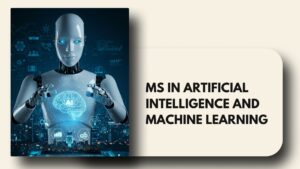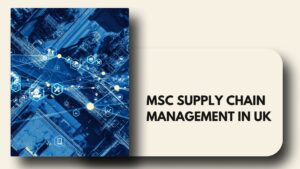- Most public universities in Germany charge zero tuition fees for MSc Data Science programs, requiring only minimal semester fees of €300-€6,000 (₹31,231-₹6.2L).
- International graduates in Germany are eligible for an 18-month job search visa, with potential pathways to permanent residency after graduation.
- Data Science professionals in Germany earn lucrative salaries ranging from €45,000-110,000 (₹46.8L-1.1Cr) annually.
- Why Choose Germany for an MSc in Data Science?
- Best Universities for MSc Data Science in Germany
- Academic Curriculum for MS in Data Science in Germany
- Top Job Roles & Salaries After MSc Data Science in Germany
- Post-Study Work Opportunities Opportunities: Pathways to Residency in Germany
- Key Takeaways by AdmitX
- FAQs

Data is transforming how we live, work, and understand the world around us. Germany has established itself as Europe’s data powerhouse, with over 137,000 tech job openings nationwide in 2025, showing strong growth in AI, cloud computing, and data science fields.
Why Choose Germany for an MSc in Data Science?
Germany’s position as Europe’s largest economy creates unparalleled opportunities for data science graduates. The country’s Industrial Revolution 4.0 initiative has positioned it at the forefront of technological advancement.
- Strong Industry Connections: German universities maintain close partnerships with tech giants like SAP, Siemens, and BMW, providing students with real-world project experience and internship opportunities.
- Affordable Education: Most public universities charge zero tuition fees and minimal semester fees, making quality education accessible.
- High Potential in Future: It is estimated that by 2025, global data will grow to 175 zettabytes, creating a large number of Data Science jobs in Germany and around the world.
- Post-Graduation Opportunities: International graduates can stay for 18 months on a job search visa, with potential permanent residency pathways.
Best Universities for MSc Data Science in Germany
Germany stands out for its Data Science master’s programs that combine cutting-edge research with affordability. Public universities typically charge only a small semester fee, and most MSc Data Science programs in Germany have a duration of 2 years.
| QS World University Rank 2026 | University | Program Name | Tuition/Semester Fee (EUR/INR) |
|---|---|---|---|
| 22 | Technical University of Munich | MSc in Data Engineering and Analytics | €4,000-6,000 (₹4.1-6.2L) |
| 105 | RWTH Aachen University | MSc in Data Science / MSc Data Analytics & Decision Science | €300 (₹31,231) |
| 243 | University of Göttingen | MSc in Applied Data Science | €436 (₹45,389) |
| 635 | Saarland University | MSc in Data Science and Artificial Intelligence | €394 (₹41,016) |
| 696 | University of Hamburg | MSc in Data Science and Artificial Intelligence | €350 (₹36,436) |
| - | Technical University of Berlin | MSc Data Science & Engineering | €360 (₹37,477) |
| - | EU Business School | MSc Analytics & Data Science | €5,450 (₹5.6L) |
| - | Technical University of Dortmund | MSc in Data Science | €350 (₹36,436) |
| - | Hertie School | Master in Data Science for public policy | €9,625 (₹10L) |
| - | SRH University | MSc in Applied Data Science in Artificial Intelligence | €1,000 (₹1L) |
| - | Fresenius University of Applied Sciences | MSc in Computer Science | €5,280 (₹5.4L) |
Eligibility Requirements for Masters in Data Science in Germany
German universities maintain high academic standards for data science programmes. Understanding these requirements helps students prepare comprehensive applications.
Academic Qualifications
Bachelor’s Degree: A 3 or 4 year bachelor’s degree in Computer Science, Mathematics, Statistics, Engineering, or related quantitative fields with a total of 180 credit points (LP).
Academic Performance: Minimum 70% marks or CGPA 7.0/10
English Language Proficiency (May vary by university)
You can potentially get an English test waiver for an MS in Data Science in Germany if you completed your prior degree in English, provided proof of which is a Medium of Instruction (MOI) certificate.
However, when a waiver is not accepted, most universities require the following minimum scores.
- IELTS Academic: Minimum overall score of 6.5 with no band below 6.0.
- TOEFL iBT: Minimum score of 88-95, with individual section scores meeting university-specific requirements.
- PTE Academic: 58-65
- Cambridge English (C1 Advanced / C2 Proficiency): Grade C or above
- Duolingo English Test: 110-120+
Standardised Tests
Public universities generally do not require GMAT or GRE scores for admission to an MSc in Data Science. However, some private institutions, such as GISMA University of Applied Sciences and EU Business School, may consider them as part of their admission process.
Academic Curriculum for MS in Data Science in Germany
The academic structure of Masters in Data Science programs in Germany combines strong foundations in statistics, mathematics, and programming with applied research and industry-relevant specialisations. Students can pursue areas such as data engineering, data analytics, and ethical aspects of data science.
Core Curriculum Components
Statistical and Mathematical Foundations
Core mathematical training includes:
- Statistical Theory
- Mathematical foundations for data analysis
- Computational methods
Programming and Technical Skills
Technical competency is developed through:
- Programming languages for data science
- Statistical computing
- Data analysis tools and methods
Applied Statistics
Statistical methodology training covers:
- Statistical inference methods
- Data analysis techniques
- Research methodology
Specialisation Areas
Data Engineering
Focuses on construction of systems for efficient and scalable data processing, including distributed systems and database systems. This track prepares students for the technical infrastructure aspects of data science.
Core Data Science Applications
Curricula integrates Statistical Data Analysis, Data Engineering, Big Data Analytics, and Ethics in Data Science, providing a comprehensive understanding of both technical and ethical considerations in the field.
Practical Learning Components
Programs incorporate Introduction to Data Science and Scientific Working components to bridge theoretical knowledge with practical application. Students engage in applied research across various domains, developing expertise in translating data science concepts into real-world solutions.
Top Job Roles & Salaries After MSc Data Science in Germany
An MSc in Data Science from Germany opens diverse career pathways in both academia and industry. Graduates benefit from strong demand across Europe’s growing tech ecosystem, with opportunities in research, innovation, and leadership roles.
| Job Role | Annual Salary Range (EUR/INR) | Top German Employers |
|---|---|---|
| Data Scientist | €55,000-80,000 (₹57.2L-83.2L) | SAP, Siemens, BMW, Mercedes-Benz |
| Machine Learning Engineer | €58,000-99,000 (₹60.3L-1Cr) | Bosch, Volkswagen, Deutsche Bank, Allianz |
| Business Intelligence Analyst | €45,000-65,000 (₹46.8L-67.6L) | McKinsey, BCG, Deloitte, PwC |
| Data Engineer | €60,000-75,000 (₹62.4L-78.0L) | Zalando, Delivery Hero, N26, Rocket Internet |
| Research Scientist (AI/ML) | €70,000-110,000 (₹72.8L-1.1Cr) | Max Planck Institute, Fraunhofer, DFKI |
| Product Data Analyst | €50,000-70,000 (₹52.0L-72.8L) | Spotify, SoundCloud, HelloFresh, FlixBus |
| Quantitative Analyst | €55,000-85,000 (₹57.2L-88.5L) | Deutsche Bank, Commerzbank, DWS |
| Data Science Consultant | €60,000-90,000 (₹62.4L-93.7L) | Accenture, Capgemini, IBM, Microsoft |
Post-Study Work Opportunities Opportunities: Pathways to Residency in Germany
- Most German public universities charge zero tuition fees for MSc Data Science programs, requiring only minimal semester fees of €300-€6,000 (₹31,231-₹6.2L).
- Germany offers over 137,000 tech job openings in 2025 with strong growth in AI, cloud computing, and data science sectors for international graduates.
- Bachelor’s degree in Computer Science, Mathematics, or Engineering with 180 credit points and 70% marks minimum required for admission eligibility.
- Actively pursue internships with German tech giants like SAP, Siemens, and BMW through university connections, as these relationships often lead to full-time offers post-graduation.
- Utilize the 18-month job search visa wisely. Start networking and applying for positions 6 months before graduation in Germany.
At AdmitX, we specialize in transforming study abroad aspirations of Indian students into success stories. Our expert counselors have guided thousands of Indian students to top German universities with customized support from course selection to visa approval.
Our end-to-end study-abroad services include:
- University Selection Guidance
- SOP Review
- Study-Abroad Document Templates
- Free IELTS Bootcamp Course
- Scholarship Assistance
- Visa Support Services
And much more!
Book your FREE study-abroad counselling session with our experts today!
Key Takeaways by AdmitX
- Most German public universities charge zero tuition fees for MSc Data Science programs, requiring only minimal semester fees of €300-€6,000 (₹31,231-₹6.2L).
- Germany offers over 137,000 tech job openings in 2025 with strong growth in AI, cloud computing, and data science sectors for international graduates.
- Bachelor’s degree in Computer Science, Mathematics, or Engineering with 180 credit points and 70% marks minimum required for admission eligibility.
- Actively pursue internships with German tech giants like SAP, Siemens, and BMW through university connections, as these relationships often lead to full-time offers post-graduation.
- Utilize the 18-month job search visa wisely. Start networking and applying for positions 6 months before graduation in Germany.
At AdmitX, we specialize in transforming study abroad aspirations of Indian students into success stories. Our expert counselors have guided thousands of Indian students to top German universities with customized support from course selection to visa approval.
Our end-to-end study-abroad services include:
- University Selection Guidance
- SOP Review
- Study-Abroad Document Templates
- Free IELTS Bootcamp Course
- Scholarship Assistance
- Visa Support Services
And much more!
Book your FREE study-abroad counselling session with our experts today!
FAQs
What are the tuition fees for MSc Data Science programmes in Germany for Indian students?
Most public universities in Germany charge little to no tuition fees for MSc Data Science, requiring only semester contributions between €300–€6,000 (₹31,000–₹6.2 lakh). For instance, RWTH Aachen University charges €300 (₹31,231) per semester, while the Technical University of Munich charges €4,000–€6,000 (₹4.1–6.2 lakh).
On the other hand, private universities have comparatively higher tuition fees, such as the Technical University of Berlin at €360 (₹37,477), EU Business School at €5,450 (₹5.6 lakh), Hertie School at €9,625 (₹10 lakh), and SRH University at €1,000 (₹1 lakh).
Which are the best universities in Germany for an MS in data science in 2026?
Technical University of Munich (QS #22) globally and offers MSc in Data Engineering and Analytics, RWTH Aachen University ranks (QS #105) with MSc in Data Science, University of Göttingen ranks (QS #243) offering MSc in Applied Data Science, whilst Saarland University and University of Hamburg also provide excellent MSc Data Science and Artificial Intelligence programmes.
What are the eligibility requirements for MSc Data Science in Germany for Indian students?
Indian students require a bachelor’s degree in Computer Science, Mathematics, Statistics, Engineering, or related quantitative fields with 180 credit points and minimum 70% marks or CGPA 7.0/10. English proficiency requires IELTS 6.5 with no band below 6.0, TOEFL iBT 88-95, PTE 58-65, or Duolingo 110-120+, whilst GMAT and GRE are generally not required.
What is the average salary for Data Science professionals in Germany after MSc?
Data Science professionals in Germany earn between €45,000-110,000 (₹46.8L-1.1Cr) annually. Data Scientists earn €55,000-80,000 (₹57.2L-83.2L), Machine Learning Engineers earn €58,000-99,000 (₹60.3L-1Cr), Research Scientists earn €70,000-110,000 (₹72.8L-1.1Cr), whilst Business Intelligence Analysts earn €45,000-65,000 (₹46.8L-67.6L).
Can Indian students work in Germany after completing MSc Data Science?
Yes, Indian students can work in Germany after completing their MSc in Data Science by applying for an 18-month post-study work visa to find employment related to their degree.
What is the duration of MSc Data Science programmes in Germany?
Most MSc Data Science programmes in Germany have a duration of 2 years, combining cutting-edge research with practical applications and offering specialisations in data engineering, data analytics, and ethical aspects of data science.
Which companies hire MSc Data Science graduates in Germany?
German employers include SAP, Siemens, BMW, Mercedes-Benz, Bosch, and Volkswagen for technical roles, Deutsche Bank, Commerzbank, Allianz, and DWS for financial services, McKinsey, BCG, Deloitte, and PwC for consulting, whilst tech companies like Zalando, N26, and HelloFresh also recruit extensively.
Do I need German language proficiency for MSc Data Science programmes in Germany?
German language proficiency is not required for English taught – MSc Data Science programmes in Germany. Universities require English proficiency through IELTS 6.5, TOEFL 88-95, PTE 58-65, or Duolingo 110-120+, though students may obtain English test waivers with Medium of Instruction certificates.
What are the specialisation areas available in MSc Data Science programmes in Germany?
German universities offer specialisations in Data Engineering focusing on distributed systems and database systems, Statistical Data Analysis and Machine Learning, Big Data Analytics, Ethics in Data Science and AI, Business Intelligence and Decision Science, Applied Data Science, and Data Science in Business and Economics.
What is the job market outlook for Data Science graduates in Germany in 2026?
Germany’s Industrial Revolution 4.0 initiative and over 137,000 tech job openings create excellent prospects for Data Science graduates in 2026. Global data growth to 175 zettabytes by 2025 ensures continued demand, whilst German universities’ partnerships with tech giants like SAP, Siemens, and BMW provide direct internship and employment pathways.
If you are an aspirant looking to study at your dream university, book an appointment with AdmitX today and start your applications early to avail yourself of all the benefits.

















